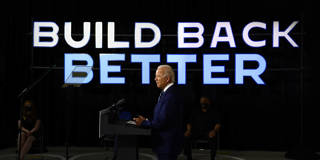Although politicians have always had incentives to cast themselves and their policy proposals in the best possible light, they now seem to be going further than ever into the realm of hyperbole. And, increasingly, the public isn’t falling for it.
STANFORD – Gone are the days when political leaders saw credibility as their most precious asset. From presidents and prime ministers on down, economic policymakers have crossed into territory beyond the familiar terrain of political hyperbole, becoming increasingly disconnected from voters’ own understanding of reality.
There are multiple explanations for this. First, today’s communication environment favors extreme statements over cold, dispassionate, fact-based analysis. In a polarized society, politicians have grown more interested in feeding their extremist base than in offering moderation or compromise.
Second, forecasts sometimes turn out badly. The claim that “inflation is transitory” was not unreasonable at first; but it became more dubious with every passing month, partly because the public has a different understanding of the term than economists do. To the average voter, transitory means “gone quickly,” a description that does not fit a problem that has not only persisted but worsened. The American baseball legend Yogi Berra famously observed that prediction is tough, especially when it is about the future. In fact, because economic data sometimes must be substantially revised, even a description of current conditions can go astray.

STANFORD – Gone are the days when political leaders saw credibility as their most precious asset. From presidents and prime ministers on down, economic policymakers have crossed into territory beyond the familiar terrain of political hyperbole, becoming increasingly disconnected from voters’ own understanding of reality.
There are multiple explanations for this. First, today’s communication environment favors extreme statements over cold, dispassionate, fact-based analysis. In a polarized society, politicians have grown more interested in feeding their extremist base than in offering moderation or compromise.
Second, forecasts sometimes turn out badly. The claim that “inflation is transitory” was not unreasonable at first; but it became more dubious with every passing month, partly because the public has a different understanding of the term than economists do. To the average voter, transitory means “gone quickly,” a description that does not fit a problem that has not only persisted but worsened. The American baseball legend Yogi Berra famously observed that prediction is tough, especially when it is about the future. In fact, because economic data sometimes must be substantially revised, even a description of current conditions can go astray.